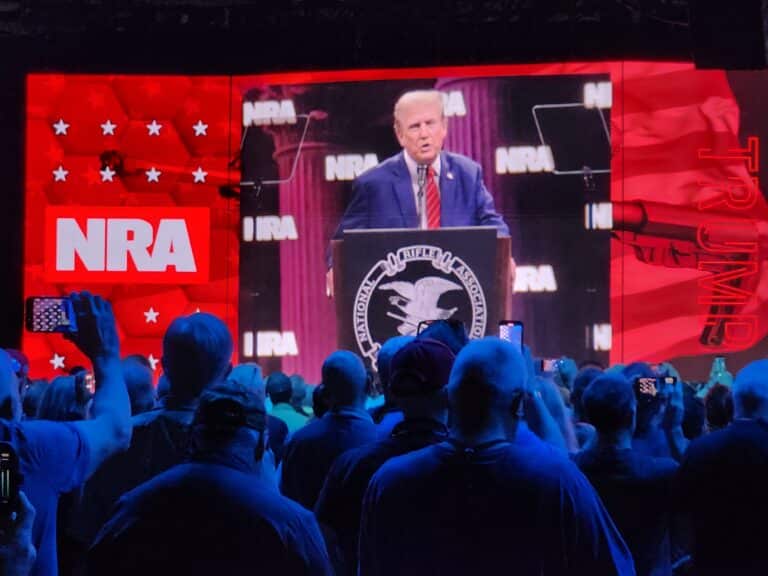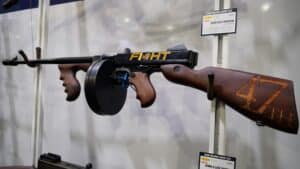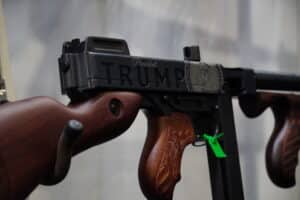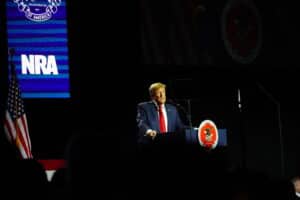Former President Donald Trump backed gun seizures as part of the answer for how to lower crime in Chicago, Illinois.
On Thursday, the Republican nominee outlined his views on the matter during the Fox News morning show. He told the hosts he believes police are “not allowed to do their jobs.” He said officers ought to be able to search people on the street for guns and then seize them because they know the local community.
“You got to let them do their job, stop and frisk, and take their gun away,” Trump told Fox and Friends. “You’ve got to do it.”
The exchange, first reported by Mediaite, is one of only a handful of times Trump has spoken about guns since the Republican National Convention. It further clarifies his view that gun seizures are necessary, at least under some circumstances. It might also alienate some gun-rights advocates, who oppose gun confiscation without due process protections.
The Trump Campaign did not respond to a request for comment on the former President’s proposal. Neither did the National Rifle Association, which has endorsed him in every election since 2016.
The comments came after Fox’s Lawrence Jones asked Trump what policies he would implement to try and solve Chicago’s long-running problems with violent crime. He said police should be allowed to search anyone walking down the street they know and think might be a threat.
“You’ve got to let the police do their jobs, number one. Number two, you have to do a policy of stop-and-frisk,” he said. “When you see a guy coming down the street and you can—the police know every one of them. They know their middle name. They know where they live. They know every one of them, the local police, and they’re great.”
Trump’s comments are in line with some he made in the aftermath of the 2018 Parkland shooting. During a bipartisan White House meeting with lawmakers, Trump backed the general concept of “Red Flag” laws. He argued police should seize firearms from potentially dangerous people before courts intervene because the legal process is often slow.
“Allow due process so no one’s rights are trampled,” then-Vice President Mike Pence said. “The ability to go to court, obtain an order, and then collect not only the firearms but any weapons in the possession of that individual—”
“Or, Mike, take the firearms first and then go to court,” Trump interrupted. “Because a lot of times, by the time you go to court, it takes so long to go to court, to get the due process procedures—I like taking the guns early.”
Trump pointed to the Parkland shooter as an example of why waiting to seize somebody’s guns could be dangerous.
“Like in this crazy man’s case that just took place in Florida, he had a lot of firearms, they saw everything—to go to court would have taken a long time, so you could do exactly what you’re saying, but take the guns first, go through due process second,” he said.
However, a bill never materialized after Democrats pursued the first Trump impeachment. Trump hasn’t repeated support for red flag laws since then.
His opponent, Vice President Kamala Harris, previously backed her own expansive gun confiscation policy. During her unsuccessful 2020 presidential primary campaign, she repeatedly expressed support for a ban on the popular AR-15 and similar firearms combined with a mandatory buyback scheme. Her 2024 campaign walked back that support once she supplanted President Joe Biden at the top of the Democratic ticket but also said she is still committed to a slew of other gun-control proposals.
“[T]he VP will not push for a mandatory buy back as president,” Lauren Hitt, a Harris spokesperson, told The Reload in July. “She has expressed support for red flag laws, universal background checks and an assault weapons ban.”
Stop-and-frisk has been a controversial policy since its inception. In 2013, a federal judge ruled New York City’s use of the practice unconstitutionally targeted minorities. But Trump and other backers of the practice have long argued it’s necessary to control crime.
While Trump was more explicit in his desire for stop-and-frisk to result in gun seizures during his Thursday comments, it is not the first time he’s endorsed the policy. As President, he told the International Association of Chiefs of Police that he had told the Attorney General’s office to undo Chicago’s consent decree in order to allow the police to start using stop-and-frisk again. He told them he wanted to “change the terrible deal the city of Chicago entered into with ACLU, which ties law enforcement’s hands; and to strongly consider stop-and-frisk.”
“It’s got to be properly applied, but stop-and-frisk works,” Trump said in 2018.
The following year, he didn’t mention the policy in another speech to the same police group. But he did talk about how police could clean up the streets if given more leeway.
“I said, ‘You’re a tough guy. How long do you think it would take you to fix this killing problem in Chicago?’ He looked at me, he said, ‘One day, sir. These cops are great. They know all the bad guys, sir. They know exactly what to do. We could straighten it out so quickly that your head would spin,'” Trump said. “I left very impressed. Whether it was one day, one week, or one month, there was no doubt he could’ve done it.”






